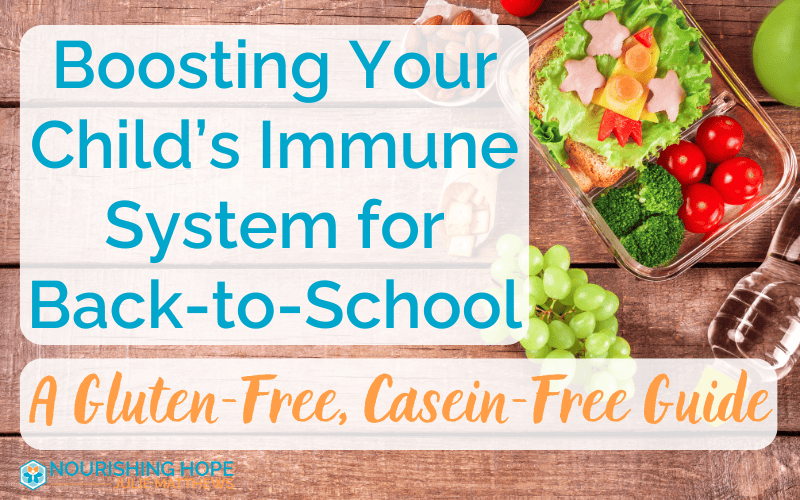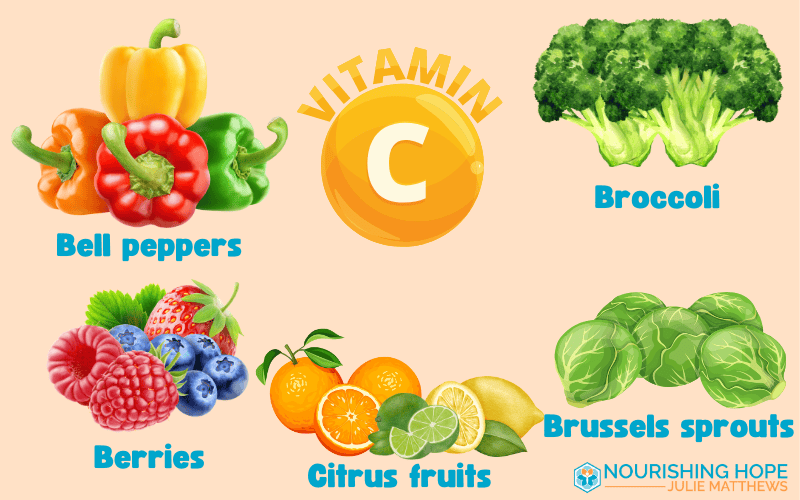
As the back-to-school season approaches, parents are often concerned about keeping their children healthy and their immune systems strong, especially during the fall when viruses and germs are common. A robust immune system can help protect against illnesses and keep kids feeling their best. Supporting your child’s immune health starts with a holistic approach that includes healthy foods, key supplements, and daily habits.
This guide will dive into immune-boosting strategies, focusing on gluten-free and casein-free (GFCF) options to accommodate children with sensitivities or on special diets.
1. Nourish with Immune-Boosting Foods
The foundation of a strong immune system is a nutrient-rich diet filled with vitamins, minerals, and antioxidants that help the body fight off infections. Here are some top GFCF foods that can help support your child’s immune health:
a. Fruits and Vegetables High in Vitamin C
 Vitamin C is essential for immune function, playing a critical role in enhancing white blood cell production and protecting cells from damage. Incorporate a variety of colorful fruits and vegetables that are naturally high in vitamin C, such as:
Vitamin C is essential for immune function, playing a critical role in enhancing white blood cell production and protecting cells from damage. Incorporate a variety of colorful fruits and vegetables that are naturally high in vitamin C, such as:
- Berries (strawberries, blueberries, raspberries): Rich in vitamin C and antioxidants, they make excellent snacks or additions to smoothies.
- Citrus fruits (oranges, lemons, limes): Great for immune support, they can be consumed fresh, juiced, or added to water for a refreshing drink.
- Bell peppers: Red bell peppers are particularly high in vitamin C and can be sliced as snacks or added to salads and stir-fries.
- Broccoli and Brussels sprouts: These are nutrient-dense vegetables that support immune health with vitamins A, C, and E.
b. Leafy Greens and Cruciferous Vegetables
Leafy greens like spinach and kale, along with cruciferous vegetables like cauliflower and broccoli, are rich in essential nutrients that help the immune system function optimally.
- Spinach: High in vitamin C and beta-carotene, spinach enhances the immune system’s infection-fighting abilities.
- Kale: Contains a wide range of vitamins, including A, C, and K, and antioxidants that help protect the body.
c. Foods Rich in Zinc
Zinc is vital for the development and function of immune cells, helping to fight infections and heal wounds. Include zinc-rich foods in your child’s diet, such as:
- Pumpkin seeds: These are not only high in zinc but also in other minerals that support overall health.
- Sunflower seeds: A great source of vitamin E, which acts as an antioxidant to support the immune system.
d. Probiotic-Rich Foods for Gut Health
Since a significant portion of the immune system resides in the gut, maintaining a healthy gut flora is crucial for overall immune function.
- Sauerkraut and kimchi: Fermented vegetables that provide beneficial probiotics.
- Coconut yogurt: A dairy-free alternative rich in probiotics that support digestive health.
2. Key Supplements for Immune Support
Supplements can provide an extra layer of immune support, especially when dietary intake alone may not meet the needs. Here are some key supplements to consider:
a. Vitamin D
Vitamin D plays a crucial role in immune health by enhancing pathogen-fighting effects and reducing the risk of respiratory infections. Given that children often get less sun exposure during the fall, supplementing with vitamin D3 can be beneficial.
b. Omega-3 Fatty Acids
Omega-3 fatty acids reduce inflammation and enhance immune function. These essential fats are beneficial not only for immune health but also for brain function and overall well-being.
c. Probiotics
Probiotics help maintain a healthy balance of gut bacteria, supporting immune function and enhancing the body’s ability to fight off illness.
d. Elderberry
Elderberry is known for its antiviral properties and ability to support the immune system. It has been shown to reduce the duration and severity of colds and flu symptoms.
e. Zinc
Zinc is an essential mineral that supports immune cell function and has been shown to reduce the duration of colds.
f. Vitamin C
Although it can be consumed through food, additional supplementation can help maintain optimal levels, especially during times of increased exposure to germs.
g. Echinacea
Echinacea is a popular herbal supplement that may help reduce the chances of catching a cold by enhancing immune activity.
3. Healthy GFCF Meal and Snack Ideas
Incorporating nutrient-dense foods into meals and snacks is a great way to keep your child’s immune system strong. Here are some ideas that are both delicious and packed with immune-boosting nutrients:
a. Breakfast Ideas
- Smoothie with Spinach, Berries, and Coconut Milk: Blend spinach, mixed berries, a banana, and coconut milk. Add chia seeds for extra omega-3s and fiber.
- Gluten-Free Oatmeal with Pumpkin Seeds and Blueberries: Top warm oatmeal with fresh blueberries, pumpkin seeds, and a drizzle of honey.
b. Lunch Ideas
- Chicken and Vegetable Soup: A nourishing soup made with chicken broth, shredded chicken, carrots, celery, and zucchini.
- Quinoa Salad with Kale, Bell Peppers, and Sunflower Seeds: A light and refreshing salad rich in vitamins, antioxidants, and immune-supportive minerals.
c. Snack Ideas
- Apple Slices with Sunflower Seed Butter: A perfect blend of vitamins, fiber, and healthy fats.
- Veggie Sticks with Hummus: Carrot, cucumber, and bell pepper sticks with a side of hummus for a nutrient-packed snack.
d. Dinner Ideas
- Baked Salmon with Steamed Broccoli and Quinoa: A meal rich in omega-3 fatty acids, vitamins, and minerals that support immune health.
- Stir-Fried Tofu with Mixed Vegetables: Tofu stir-fried with an assortment of vegetables, like bok choy, carrots, and snap peas.
4. Avoid Immune-Compromising Foods and Additives
Certain foods and ingredients can compromise immune function, particularly in children with sensitivities. Avoiding these can help keep your child’s immune system robust:
a. Sugary Foods and Beverages
Excessive sugar intake can suppress the immune system by reducing the ability of white blood cells to combat infections. High-sugar diets are also associated with increased inflammation and poor gut health, which can weaken immune defenses.
- Examples to Avoid: Sodas, candy, pastries, sweetened cereals, and fruit juices with added sugars. Instead, opt for naturally sweet options like fruits or smoothies without added sugars.
b. Processed Foods
Processed foods are often loaded with unhealthy fats, preservatives, and additives that can negatively affect immune function. These foods lack essential nutrients and can contribute to inflammation and poor overall health.
- Examples to Avoid: Packaged snacks, chips, frozen meals, and fast food. Focus on whole foods prepared at home with fresh ingredients.
c. Artificial Colors and Flavors
Artificial additives can disrupt gut health and are linked to behavioral changes in some children. These chemicals may also contribute to inflammation and immune dysregulation.
- Examples to Avoid: Colorful candies, flavored drinks, and processed snacks that list artificial colors and flavors. Opt for natural, whole-food snacks.
d. Gluten and Casein in Sensitive Individuals
For children sensitive to gluten and casein, these proteins can cause inflammation and immune dysfunction, particularly affecting the gut lining and contributing to overall immune system challenges.
- Examples to Avoid: Wheat-based products, bread, pasta, dairy products like cheese, and milk. Instead, choose gluten-free grains like quinoa and dairy alternatives such as almond or coconut milk.
Conclusion
Supporting your child’s immune system during the back-to-school season is about consistency and making intentional choices. By focusing on nutrient-dense, gluten-free, and casein-free foods, incorporating key supplements, and maintaining healthy habits, you can help your child stay healthy and resilient. Remember, it’s the small daily actions that collectively bolster your child’s immune health, setting them up for a strong and healthy school year.
Always consult with your healthcare provider before introducing new supplements to ensure they are safe and appropriate for your child. Here’s to a healthier, happier, and immune-strong fall season!




0 Comments